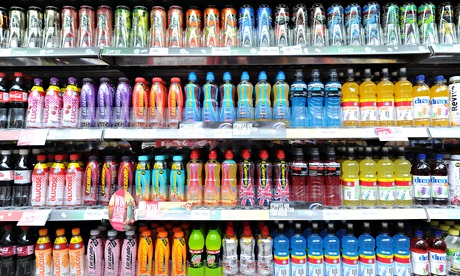
A third of British children and two-thirds of British adults are obese or overweight. Diabetes levels have doubled in the past two decades. However, contrary to popular belief this is not primarily due to our increasingly sedentary lifestyles. It mainly results from excess calories in our food and sugary drinks.
Added sugars are hidden everywhere in modern food: often there are four teaspoons of sugar in a tin of soup, five in a typical TV dinner, six in a yoghurt, nine in a can of cola. At best, these added sugars are empty calories with zero nutritional value; at worst, they are toxic.
Common sugar comprises glucose and fructose. Many scientists are convinced that the current high amounts of fructose consumption are harmful. Fructose molecules are processed in the liver into fat. This triggers the release of insulin (creating a pre-diabetes state) and raises blood pressure. Type 2 diabetes could mean a life of increasing complications and an earlier death from a heart attack, stroke, cancer or dementia. Every week, this scientific evidence is strengthened.
My daughter's friend Susan (not her real name) is a delightful 11-year-old, but a little chubby. Her school recently scheduled an additional hour of games for her class each day. Susan might burn off an extra 100 kcal at each session, a weekly total of 500 kcal. But on the way home on Fridays, Susan stops off for her reward: a cheeseburger. Yes, you've guessed it, 500 kcal in five minutes. Plus cheap sugary cola, a further 110 kcal. Once home, Susan sits down to watch television and absorbs the heavy marketing of junk food, sweets and sugary drinks. If her mum is working late, Susan heats up a TV dinner (400kcal), washing it down with a can of sugary pop (140kcal). And so her weight increases. Like millions of other kids in Britain today.
Meanwhile, multibillion-pound industries get rich through manufacturing, marketing and retailing junk food and sugary drinks. Above all, they fear any regulation that might threaten future sales. So they focus on other (ineffective) options, such as Andrew Lansley's "responsibility deal" between 2010 and 2014, and promote "nudging" as a trendy approach to change behaviour. Public health scientists had seen voluntary agreement games played previously. In 2010, they predicted it would not work.
The four years of the responsibility deal mostly involved industry and government sitting around tables dreaming up high-profile pledges to "cut a billion calories" or minimally reduce sugar content in isolated products. The deal gave companies a lot of publicity. The taxpayer has thus funded industry PR, but obesity has increased. And just two weeks ago came further revelations that many well-known companies had reneged on their pledges.
Furthermore, the deal was used by government and industry as an excuse to reject more effective approaches. Indeed, the tactics used by Big Tobacco, Big Booze and now Big Food lobbyists look similar: denial, delays, detours and dramatic distractions.
Government attempts to reduce calories and sugar have failed (though industry apologists try to disagree). So what is needed now? Big Tobacco had five glorious decades of unregulated profit before being controlled by addressing the "3As": affordability (taxes and price rises), acceptability (marketing bans and warning labels), and availability (licensing and smoke-free legislation). These are potentially transferable to junk food or sugary drinks.
Campaigners have urged the health secretary, Jeremy Hunt, to impose a sugary drinks duty, a marketing ban, mandatory traffic light labelling, and progressive sugar and saturated fat reductions in junk food. They also want him to reduce portion sizes, end industry sports sponsorship and establish an independent food policy institute.
Hunt, a gifted and ambitious politician, is stuck between the rock-like Scylla of industry lobbyists and the Charybdis whirlpool of public opinion, which now supports sugar regulation. My money is on the whirlpool.

